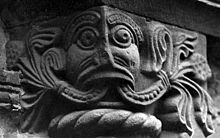This article has multiple issues. Please help improve it or discuss these issues on the talk page. (Learn how and when to remove these messages)
|


| Culture of England |
|---|
 |
| History |
| People |
| Languages |
| Mythology and folklore |
| Cuisine |
| Religion |
| Art |
| Literature |
English folklore consists of the myths and legends of England, including the region's mythical creatures, traditional recipes, urban legends, proverbs, superstitions, dance, balladry, and folktales that have been passed down through generations, reflecting the cultural heritage of the country. This body of folklore includes a diverse array of characters, such as heroic figures like Beowulf or Robin Hood, legendary kings like Arthur, and mythical creatures like the Green Man and Black Shuck. These tales and traditions have been shaped by the historical experiences of the English people, influenced by the various cultures that have settled in England over centuries, including Celtic, Roman, Anglo-Saxon, Norse, and Norman elements.[1]
The stories within English folklore often convey themes of justice, loyalty, bravery, and the supernatural, and often contain a moral imperative stemming from Christian values.[2] They frequently explore the relationship between humans and the natural world, as seen in the legends of the Green Man or Herne the Hunter, or the consequences of human actions, as illustrated in tales like the Lambton Worm.
Additionally, English folklore has been influenced by historical events, such as the witch trials of the early modern period, which are reflected in stories like that of the Pendle witches. During the Renaissance in the 16th century, England looked to more European texts to develop a national identity. English folklore has continued to differ according to region, although there are shared elements across the country.[3] The folktales, characters and creatures are often derived from aspects of English experience, such as topography, architecture, real people, or real events.[4]
English folklore has had a lasting impact on English culture, literature, and identity. Many of these traditional stories have been retold in various forms, from medieval manuscripts to modern films and literature. To this day, traditional folk festivals such as May Day, Plough Monday, Bonfire Night, Allhallowtide, and Harvest festival continue to be practised. Morris dancing, Mummers' plays, and Maypole dancing remain popular forms of folk traditions, often depicting or echoing themes or stories from English folklore.
- ^ McDowall, Robert (26 September 2019). "English Folklore: What Cultural Values Does It Represent?". #FolkloreThursday. Archived from the original on 24 July 2021. Retrieved 30 December 2021.
- ^ Mingazova, Liailia; Sulteev, Rustem (2014). "Tatar and English Children's Folklore: Education in Folk Traditions". Western Folklore. 73: 410–431 – via ProQuest.
- ^ Cheeseman, Matthew; Hart, Carina, eds. (2022). Folklore and nation in Britain and Ireland. New York. ISBN 978-1-003-00753-1. OCLC 1250431455.
{{cite book}}: CS1 maint: location missing publisher (link) - ^ Simpson, Jacqueline (2008). "Seeking the Lore of the Land". Folklore. 119 (2): 131–141. doi:10.1080/00155870802056936. S2CID 162117834.